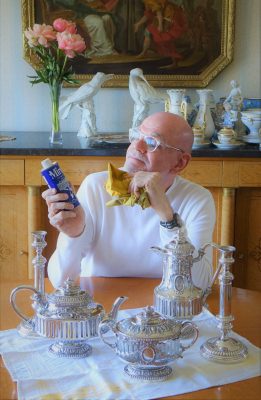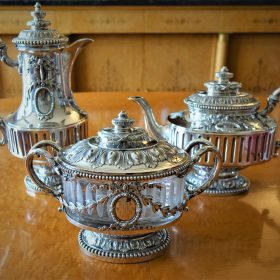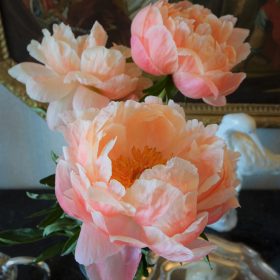Humbly toiling in the service of Nicholas II…
 As the artists among us know so well, expert-level perfection does not come easily, whatever the trade or craft, and it never did. Despite changing taste over the years, the search for perfection is what we admire and what people applaud, and that is what remains timeless. Quality is what we value.
As the artists among us know so well, expert-level perfection does not come easily, whatever the trade or craft, and it never did. Despite changing taste over the years, the search for perfection is what we admire and what people applaud, and that is what remains timeless. Quality is what we value.
These sterling silver pieces and others will be put up for auction later in the year. In preparing them to be photographed by Jacques, they needed some very respectful deep cleaning and polishing. I was anointed with that sacred responsibility – and required elbow grease.
The manufacturer named Odiot, Paris, still has a store on the Place de la Madeleine. I know because I was there just a few years ago to sell some 1850-ish vermeil (gold plating on silver) forks and spoons which each bore that respected master craftsman’s ‘poinçon,’ or maker’s mark.
I actually like manual work, and seem to have the required patience for detail. My father worked with his hands, spot-welding. Mom did needlepoint, canned, baked, and seemed to find beauty in scrubbing her kitchen floor. My German ancestors boasted tool-and-die makers, dress makers, and mechanics. Maybe my approach to art and music was formed in this craftsman-like viewpoint.
Because of the fine details in the silver pieces, more than a couple of hours were required, spent in solitude, which offered me a rare time for reflection, standing and toiling, back at the kitchen sink. But instead being a dreaded labor, the minutes which drew on to hours became ennobling, as if a kind of sacred mission, or rite. Polishing as a passage to perfection.
Foremost, I was filled with admiration for the high level of craftsmanship. The manual toil of buffing and re-buffing the fine chisel work made me all the more observant of detail. It made me realize for example how each separate piece of one teapot: the body, the attached lid, the base, the handle, had its own poinçon. I observed how the smooth, highly-reflective and brilliant silver surfaces are set off with leafy details or by the darker textured insets and sculpting whose shapes give rhythm and detail to the design.
While at work these last few days, my thoughts turned to Bernard Pivot’s famous Ten Proust Questions, the last of which is “If God exists, what would you like Him to say to you after you die?”
My answer today would be: “C’mon in. People devoted to Beauty are always welcome here!”
*
Footnote: yes, those luscious pink peonies are fresh, and real.



